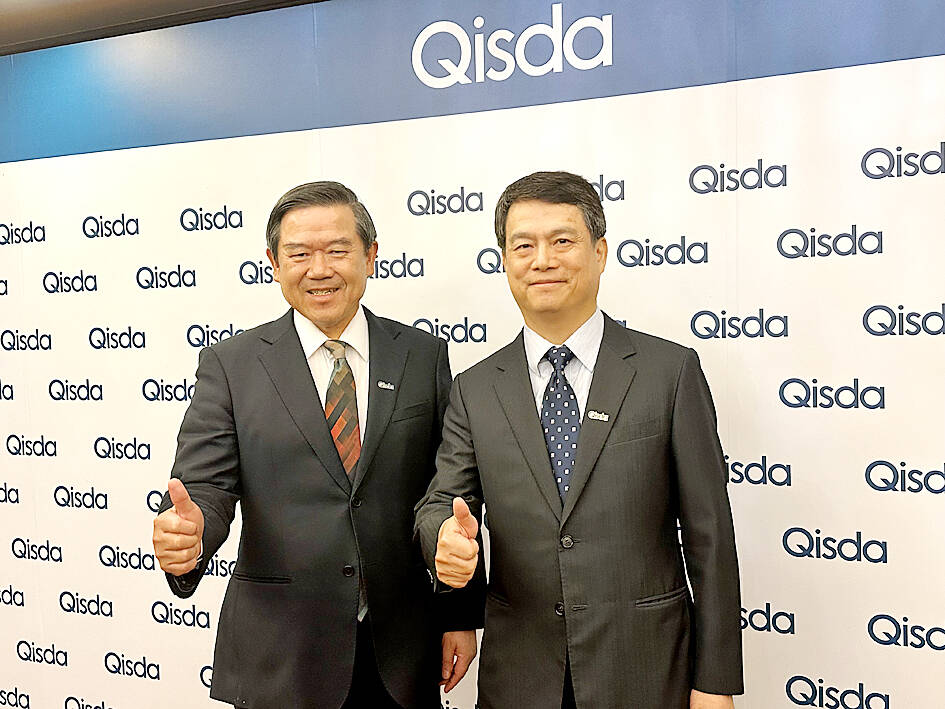Liquid-crystal display and projector manufacturer Qisda Co (佳世達) yesterday said second-quarter revenue is expected to be better than the first quarter, which rose 6 percent year-on-year to NT$49.75 billion (US$1.64 billion).
However, the outlook remains uncertain, as shipments could be affected by the outcome of US trade talks, the end of the 90-day tariff pause on July 8, a stronger New Taiwan dollar and geopolitical tensions such as tensions between India and Pakistan, Qisda chairman Peter Chen (陳其宏) said at an online earnings conference.
“We will strive to maintain the revenue growth in the second quarter,” Chen said.

Photo: Chen Mei-ying, Taipei Times
Regarding the potential impact of US tariff uncertainty, Qisda president Joe Huang (黃漢州) said the company is considering building new factories in countries with lower US tariffs such as Mexico, and might relocate its artificial intelligence or industrial production lines to the US.
Qisda has small processing plants in California and would use them as a base to expand local operations, Huang said, adding that the company might seek another site if orders exceed the existing plants’ capacity.
To cope with the recent NT dollar surge, the company is adopting a natural hedging strategy to ease potential risks, while using foreign exchange forward contracts as alternative buffers, Qisda chief financial officer Jasmin Hung (洪秋金) said.
The rapid appreciation of the NT dollar is likely to affect revenue in key business sectors in the coming months, but at the same time some of the company’s more than 200 global operations using various currencies could benefit from the currency fluctuations, she said.
Qisda’s net profit in the first quarter reached NT$594 million, up 50 percent from a year earlier, with earnings per share at NT$0.25.
Gross margin rose 1.3 percentage points year-on-year to 17.3 percent — its highest ever — driven by optimized product and business mix, while operating margin was flat at 2 percent, the company said.
By sector, information and communications technology (ICT) revenue rose 7 percent year-on-year to NT$27 billion in the first quarter, followed by business solutions at NT$8.1 billion, medical applications at NT$7.2 billion, networking and communications business at NT$4.5 billion, and others at NT$3 billion, Qisda said.
The medical sector showed strong growth potential, accounting for 14 percent of total revenue and ranking second among the company’s high-value-added sectors, while networking and communications contributed only 9 percent due to industry contraction, Chen said.
The medical sector would be Qisda’s main growth driver this year, and the company plans to expand its investments in the field to differentiate itself from other ICT rivals, he said.
Revenue from the US accounted for 26 percent of Qisda’s total, but just 1 percent of its medical sector revenue, leaving room to adjust its strategy for revenue and profit growth in the coming quarters as the sector is less affected by tariff uncertainty, he said.

In Italy’s storied gold-making hubs, jewelers are reworking their designs to trim gold content as they race to blunt the effect of record prices and appeal to shoppers watching their budgets. Gold prices hit a record high on Thursday, surging near US$5,600 an ounce, more than double a year ago as geopolitical concerns and jitters over trade pushed investors toward the safe-haven asset. The rally is putting undue pressure on small artisans as they face mounting demands from customers, including international brands, to produce cheaper items, from signature pieces to wedding rings, according to interviews with four independent jewelers in Italy’s main

Japanese Prime Minister Sanae Takaichi has talked up the benefits of a weaker yen in a campaign speech, adopting a tone at odds with her finance ministry, which has refused to rule out any options to counter excessive foreign exchange volatility. Takaichi later softened her stance, saying she did not have a preference for the yen’s direction. “People say the weak yen is bad right now, but for export industries, it’s a major opportunity,” Takaichi said on Saturday at a rally for Liberal Democratic Party candidate Daishiro Yamagiwa in Kanagawa Prefecture ahead of a snap election on Sunday. “Whether it’s selling food or

CONCERNS: Tech companies investing in AI businesses that purchase their products have raised questions among investors that they are artificially propping up demand Nvidia Corp chief executive officer Jensen Huang (黃仁勳) on Saturday said that the company would be participating in OpenAI’s latest funding round, describing it as potentially “the largest investment we’ve ever made.” “We will invest a great deal of money,” Huang told reporters while visiting Taipei. “I believe in OpenAI. The work that they do is incredible. They’re one of the most consequential companies of our time.” Huang did not say exactly how much Nvidia might contribute, but described the investment as “huge.” “Let Sam announce how much he’s going to raise — it’s for him to decide,” Huang said, referring to OpenAI

The global server market is expected to grow 12.8 percent annually this year, with artificial intelligence (AI) servers projected to account for 16.5 percent, driven by continued investment in AI infrastructure by major cloud service providers (CSPs), market researcher TrendForce Corp (集邦科技) said yesterday. Global AI server shipments this year are expected to increase 28 percent year-on-year to more than 2.7 million units, driven by sustained demand from CSPs and government sovereign cloud projects, TrendForce analyst Frank Kung (龔明德) told the Taipei Times. Demand for GPU-based AI servers, including Nvidia Corp’s GB and Vera Rubin rack systems, is expected to remain high,